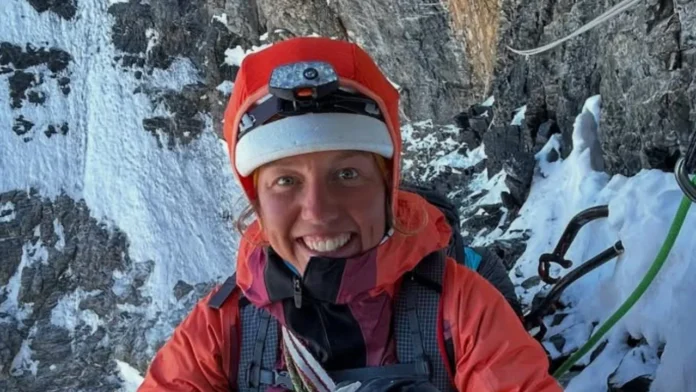GILGIT_A tragic accident claimed the life of a German mountaineer earlier this week when he was struck by falling rocks while attempting to scale the breathtaking yet perilous Laila Peak, located in the Hushe Valley of Gilgit-Baltistan. The incident occurred during a high-altitude expedition on the 6,096-metre peak, one of the most visually stunning and technically challenging climbs in the Karakoram mountain range.
According to local officials and sources close to the expedition, the climber was part of a two-member German team that had been in the region for several weeks preparing for the ascent. During their climb, the mountaineers encountered a sudden rockfall — a common but deadly hazard in mountainous terrain — which fatally struck one of them. His partner, though unharmed, witnessed the incident and immediately contacted local authorities and rescue teams for assistance.
Following the distress call, local high-altitude porters and search-and-rescue specialists mobilized to reach the site. Despite the treacherous terrain and high elevation, the body of the deceased climber was successfully retrieved and transported to Skardu. Officials confirmed that arrangements are now being made to transfer the remains to Islamabad before repatriation to Germany, in coordination with the German embassy.
Laila Peak, though not among the tallest in the region, holds a reputation for being both beautiful and dangerous. Its unique shape — often compared to a crescent moon or the Matterhorn of the East — and near-vertical summit slopes make it a dream climb for seasoned alpinists but also pose significant risks. The mountain has a history of fatal accidents, particularly during the summer climbing season when rising temperatures cause ice melt, increasing the likelihood of avalanches and rockfalls.
This latest incident has once again drawn attention to the inherent dangers of high-altitude climbing, especially in remote regions like Gilgit-Baltistan, where rescue operations are difficult and weather conditions can change in an instant. Local officials have reiterated their call for climbers to strictly adhere to safety protocols, undergo proper acclimatization, and employ experienced guides and support staff.
“We deeply mourn the loss of the foreign climber and extend our heartfelt condolences to his family,” a spokesperson from the Gilgit-Baltistan Tourism Department said. “Mountaineering is a test of human endurance and courage, but it comes with serious risks. We urge all climbers to take all necessary precautions and respect the mountain environment.”
The tourism department also emphasized the need for better communication systems, more accessible rescue services, and updated weather monitoring facilities to prevent similar incidents in the future. In recent years, Pakistan has seen a steady increase in foreign mountaineers visiting its northern regions, drawn by world-famous peaks like K2, Nanga Parbat, and Laila Peak.
While the government encourages this surge in adventure tourism, there have also been growing calls from within the mountaineering community for improved safety regulations, better route management, and more investment in mountain rescue infrastructure.
Back in Germany, the news of the climber’s death was met with sorrow from the local mountaineering community. Tributes poured in online, describing him as a passionate and experienced climber who had long dreamed of reaching the summit of Laila Peak. Friends and fellow adventurers shared their grief and remembered his dedication to the sport.
This incident marks another somber moment in what has otherwise been a vibrant climbing season in Pakistan. With dozens of international expeditions currently underway in the Karakoram and Himalayas, mountaineering officials and rescue teams remain on high alert, aware that while the peaks offer glory and beauty, they also demand utmost respect and caution.


























